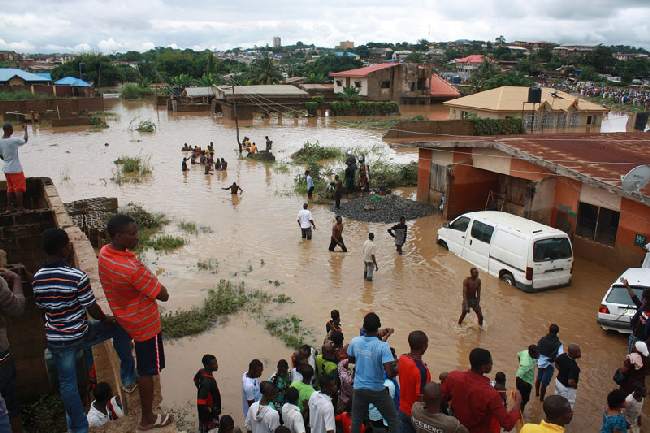The manifestations of climate change has had its effects- directly or indirectly on the human health. The World Health Organisation (WHO) in its estimates reported that 150,000 deaths were caused by climate change in the year 2000. In 2003, WHO conducted another study which revealed that 5.5 million healthy years of life were lost worldwide due to debilitating diseases caused by climate change. Increasingly, there have been evidences that points clearly the effects of climate variability on the quality and availability of water supplies. In 2002, Sharon and Macol in “Gender, Population and Environment”, narrated that current scientific research shows that climate change will have major effects on precipitation, evapotranspiration, and runoff — and ultimately on the water supply.
Undoubtedly, water is the most abundant molecule on earth, it is approximately 70% of the earth’s surface. In addition, depending on age and body size, the human body is usually 58%-78% water and there are about 326 million cubic miles of water on earth, with groundwater and rainwater as the major source of freshwater. “If 50% of the world population lives within 150kms off the shore, if 13 of the world’s largest cities are on the coast, and if the coast provides 25 % of all primary biological productivity and 80– 90% of the global fishing catch,” why then is it estimated that 1.1 billion people don’t have easy access to drinking water, and 2.6 billion people don’t have water that’s clean enough? Can one relate this to Climate Change? Perhaps that explains Ken Saro-Wiwa’s saying – “water, water everywhere yet there is no water to drink”.
The Third Assessment Report of the Intergovernmental Panel on Climate Change (IPCC) from 2001 as opined by Heike Spohr, estimates a rise of the sea level until the year 2100 between 9 and 88 cm. This and subsequent land loss especially in coastal areas will have severe effects on local population, hence, an increase in sea level has been proven to cause saltwater intrusion to groundwater thereby deteriorating the quality of water. Also, uncertainty in changes to spatial and temporal pattern of rainfall due to global warming poses a threat to availability of water.
Sea level rise is already putting low-lying coastal populations at risk, and intense rainfall events are projected to increase with climate change. This increases the risk of flooding, which can introduce chemicals, pesticides, and heavy metals into water systems and increase the risk of water-borne disease outbreak. In Nigeria, over fifteen communities and farm plantations worth millions of naira was submerged by flood in Shonga district, Edu Local Government Area of Kwara State in 2010. Little wonder the National Emergency Management Agency (NEMA) reported that over 250,000 Nigerians were displaced by flood disasters that wreaked vast destruction on many communities across the nation.
“Flooding from the rain literally shut down Lagos metropolis, forcing people to stay indoors and leaving some major roads and highways flooded. It also affected Ondo, Ogun, Osun, Rivers, Edo, Enugu, Cross River, Anambra and Oyo States” (The Guardian 11 July, 2011). During the 2012 flooding in Nigeria, 30 out of the 36 states was affected, 363 lives were lost, over 2.1million people displaced, and a whopping 7 million plus people were affected, with total damages hitting an incredible 2.6trillion naira (NEMA November 5, 2012).
Increases in temperature and rainfall are expected to contribute to increased outbreaks of cholera, diarrhea, Salmonella, Campylobacter, enteric infections, and rotavirus. Harmful algal blooms can form, which produce toxins that can affect water supplies and can be passed up the food chain to humans. Children are especially vulnerable to food and water borne diseases because they are more likely to die from dehydration, diarrhea, and vomiting. Minority children and children of lower socioeconomic status in areas that lack adequate capacity to provide food and water supplies are at the greatest risk.
Shaibu Victor advanced yet another argument in “Innovative financing for adaptation to climate change” when he opined that no longer is it strange, the fact that climate change has impacts on the health of man, noting that the decline in the quality of air we breathe and wild fire suggests a clear indication of the phenomena. Stressing further, “A change in the weather condition that our body is already used to will definitely affect our body chemistry or system, and this will ultimately take its toll on our health”.
In a nut shell, climate change has a role to play in the episodes of flooding and prolonged rain spells (drought) in Nigeria in the past few years. Evident by short-lived raining engagements in a calendar year, fiercer rain and wind, wells drying up so fast, farmers decrying the non-availability of water for agriculture and irrigational purposes to mention but a few. A Reflection on this happenings reminds one of W. H. Auden, who said that “thousands have lived without love, not one without water”. Therefore, the call to act against climate change, is a call not just for the government, policy makers, experts, journalists, activists etc. it is a clarion call for all and sundry to take precautionary measures against the woes of climate change in the interest of the environment and humanity.



Leave a Reply